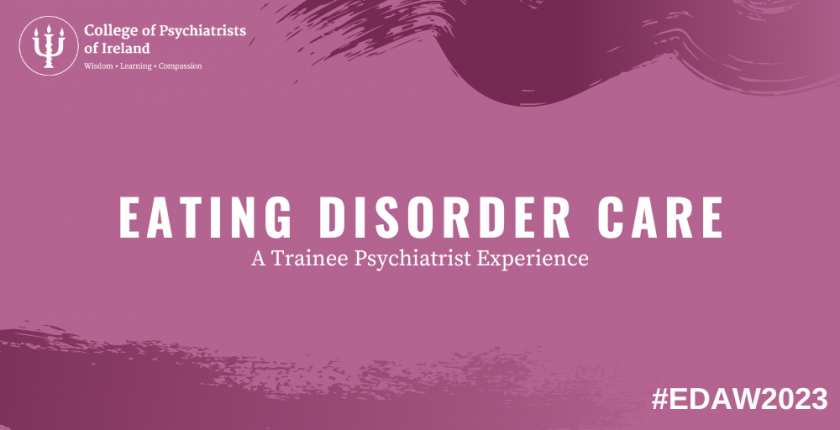Blog
Eating Disorder Care – A Trainee Psychiatrist Experience #EDAW23
- March 2, 2023
- Posted by: ICP
- Category: Blog External Affairs & Policy Public Information Stakeholders

Eating Disorder care is often not built into the structure of health services, which combined with under-resourcing can lead to doctors and team members filling the gaps in wraparound support.
Dr Petra McLoughlin, Basic Specialist Trainee in psychiatry shares her experience of advocating for more training and funding in the health services for integrated eating disorder care.
As a psychiatry trainee, I have been lucky to have a mentor in consultant Specialist in Child and Adolescent Psychiatry, Dr Claire Veitch. Dr Veitch has a special interest in eating disorders and has supported case discussion and guided me towards various trainings over the years.
Prior to psychiatry training, I recall the challenge of advocating for those with eating disorders within a medical team. The prevailing attitude was an interest in the medical causes of weight loss and a sense that in the absence of a ‘medical cause’ those with eating disorders should not be admitted. This led me to complete a study on the level of eating disorder knowledge in Emergency Medical, Paediatric and Psychiatric staff that was published by the Royal College of Psychiatry Eating Disorders Conference 2021. The study revealed that across all the involved specialties, knowledge was below the predetermined standard and led to a subsequent training webinar to improve staff expertise. This webinar was well-received and requested by the participants to be delivered again at regular intervals. However, this proved challenging due the demands of BST training. This highlights that staff are keen for training but regular structured educational sessions in this area are not always available.
Over the course of my training I have observed a marked increase in the number of people with eating disorders presenting for assessment and treatment. I have also encountered challenges presented by inconsistent approaches to this within different medical hospitals.
While some services suffer from unclear planning, communication challenges, and under-resourcing, others develop proactive planning consisting of in-reach services to the paediatric ward, with a ‘pop up’ MDT consisting of paediatrics, dietetics and CAMHS that utilise clear behavioural management plan guidelines to accompany the MEED guidelines. The advantages of a structured, evidence-based approach are clearly felt by patients, carers, and medical staff alike.
The unfortunate downside to this structured approach is that it is often not sufficiently resourced and leads to a huge strain on overall workload, with other team members having to fulfil the role of dietician or a CNS due to inadequate recruitment and retention in these areas. I find myself trying to provide education to families on Family Based Therapy (FBT) and create meal plans, despite lacking in training in this, in order to fill a service gap. However, someone needs to provide the wraparound care and it inevitably falls to the doctors on the team.
I am part of a team setting up a Special Interest Group for Eating Disorders across the 4 CAMHS in Sligo/Donegal. Our aim is to increase knowledge, advocate for training and to provide peer support to members. We have encountered numerous challenges when navigating the complex HSE landscape trying to source funding and approval for training and development. In the absence of a structured training pathway for evidence-based training such as FBT, the only option is to use our individual training funds which are already stretched to cover study materials, psychiatry exams, conferences, CPD webinars, printing posters etc. It is difficult for trainees to access other funding from within the HSE as we are viewed as temporary workers.
However, the barriers will not deter me! I tend to grab any medical student I spot on the corridors every time I go to the paediatrics ward to bring them along to reviews and Multi-Disciplinary Team meetings. I teach NUIG undergraduate medical students their eating disorder lecture and participate in lecturing in St. Angela’s postgraduate nursing course in eating disorders, as well as the Belfast University undergraduate course. With another team member, we are providing a session to the medical hospital on the new MEED guidelines. An interesting comment from the paediatric CNS prior to this was ‘Are CAMHS leading out on the MEED guidelines? And are other hospitals adopting the MEED guidelines or is it just us?’. This gives an idea of the long way to go to bring everyone on board – hopefully towards a situation where the entire team can lead out within their discipline on the care for individuals struggling with eating disorders, not just individual MDT members with a special interest.
Dr Petra McLoughlin is a Psychiatry Trainee BST 2, currently working in Sligo with a special interest in CAMHS and eating disorders.
Resources for Eating Disorder Help:
The HSE National Clinical Programme for Eating Disorders (NCP-ED) is a collaborative initiative between the HSE, the College of Psychiatrists of Ireland, and BodyWhys – the national support group for people with eating disorders.
The HSE Self-Care and information App is available to download to your mobile phone and provides accurate, up-to-date information and tips on how to stay well when managing an eating disorder
Bodywhys is the national voluntary organisation supporting people with eating disorders. Bodywhys is committed to the belief that people can and do recover from eating disorders. They strive to empower people affected by eating disorders to access information, support and treatment.
PO Box 105, Blackrock, Co.Dublin
Helpline: 01 2107906
Email: alex@bodywhys.ie
Website: www.bodywhys.ie
